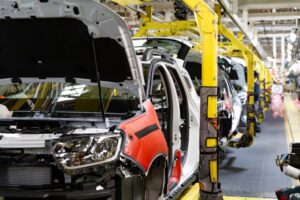Shares in major car manufacturers around the world surged on Monday after President Trump signalled that he may offer temporary exemptions to the steep new tariffs imposed on imported vehicles and parts.
Speaking to reporters, Trump said he was “looking at something to help car companies”, noting that manufacturers needed “a little bit of time” to relocate production to the United States. While he gave no specifics on what product exclusions might be introduced, or for how long, the remarks were enough to lift investor confidence across the auto sector.
The president’s comments come just weeks after his administration announced a 25 per cent tariff on imported fully built vehicles, which came into effect on 3 April, with duties on imported car parts expected to follow by 3 May. Trump had initially insisted the measures would be permanent, with no carve-outs for foreign producers.
In Japan, shares in Toyota climbed by 3.7 per cent, while Honda rose by 3.6 per cent. European carmakers also enjoyed a boost: Stellantis rose by 5.6 per cent to €8.26, Volkswagen by 3.3 per cent to €90.26, and Mercedes-Benz added 2.9 per cent, reaching €50.70. French automotive supplier Valeo was up by 4.3 per cent.
In the UK, luxury carmaker Aston Martin Lagonda rose to the top of the FTSE 250, gaining 68¾p or 4.9 per cent in morning trading. The company, which does not manufacture in the US but counts America as nearly a third of its sales market, recently announced plans to raise £125 million to help navigate the impact of the tariffs.
The Society of Motor Manufacturers and Traders (SMMT) has warned that the US tariff regime poses a serious threat to Britain’s automotive exports. The US is the second-largest export market for UK-built cars, accounting for 16.9 per cent of vehicle exports last year—around 100,000 vehicles.
In response to the uncertainty, Jaguar Land Rover earlier this month paused all US-bound shipments for at least four weeks as it reassessed its strategy under the new trade conditions.
Although Trump’s remarks stopped short of confirming any formal policy shift, markets interpreted them as a softening of the previously hard-line stance. Any delay or exemption could offer a crucial window for manufacturers to adjust supply chains and production planning amid rising geopolitical and trade tension.
Industry leaders and investors will now be watching closely for further details on any proposed exclusions as the deadline for auto parts tariffs draws near.
